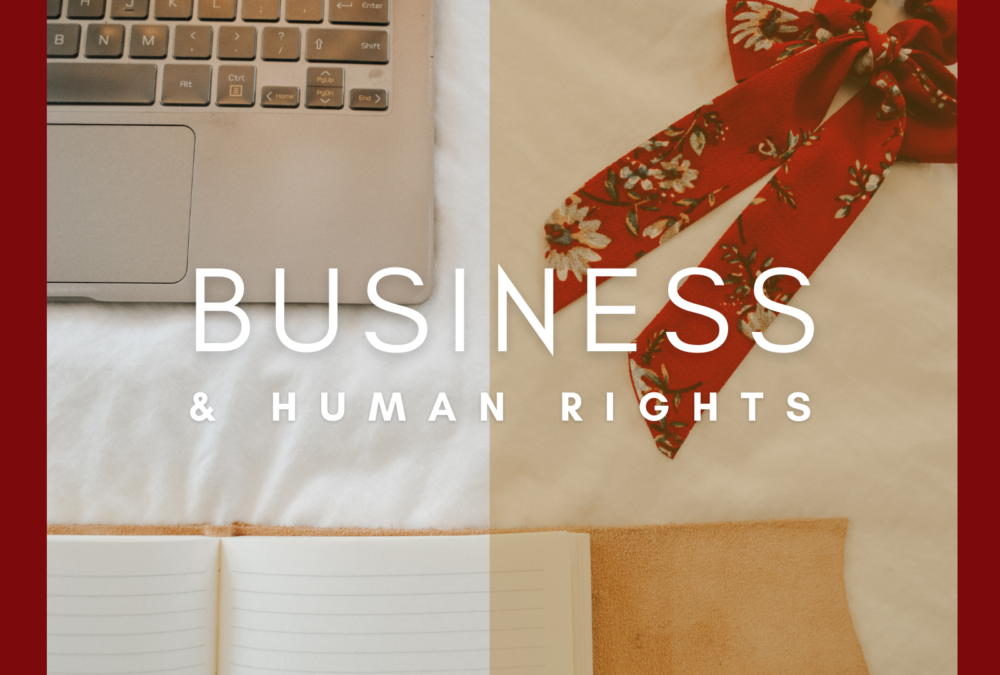Over the past few months, and really since founding Novel Hand, I’ve been learning more and more about the power and influence of business– both for good and for bad.
It started at the Turner Family Center for Social Ventures Summit, and continued when I interviewed Connie Tsai of Nisolo for the Novel Hand podcast (which is back, by the way). In quarantine, I’ve been doing more digging– which led me to conversations with my sister about corporate social responsibility, an article about institutional impact earlier this week and this week’s Handful series on B Corporations.
In the past month, I’ve honed in on the intersection between business and human rights. Through learning about the problem of low wages and unsafe working conditions in the fashion industry, I explored the issue of supply chain transparency.
Today, I’m sharing about the foundation of the relationship business and human rights and laying the groundwork for a new series on the intersection between these topics.
What is Corporate Social Responsibility?
Erika wrote that corporate social responsibility, “describes various ideas and business models that help a company be socially accountable to its consumers, competitors, the public, stakeholders, investors, and even itself.”
Loosely defined, corporate social responsibility is a form of self-regulation — businesses commit to pure philanthropy, environmental sustainability or another project. They might just be claiming to “do no harm,” rather than actively creating positive impact.
Here’s Where Human Rights Come in
While many corporations altruistically practice corporate social responsibility, many don’t. And often, corporate social responsibility isn’t enough to protect human rights.
In Bangladesh, garment workers don’t make a living wage. Uighur Muslims in China are enslaved to harvest cotton that could end up as a t-shirt sold at Gap or H&M. In the Democratic Republic of Congo, workers at palm oil plantations are exposed to toxic pesticides.
How did this happen?
After World War II, the United Nations was founded. Following the destruction of WWII, human rights emerged as even more important to society, and in 1948 the UN adopted the Universal Declaration of Human Rights (UDHR). This document confirmed the fundamental rights of human beings.
Following WWII, states were the most dominant actors in the global sphere. With this power, states were entrusted to protect and defend human rights. While the UDHR wasn’t international law nor was it legally binding, more than 185 states incorporated its principles into their constitutions.
Since WWII, globalization caused a shift in power and influence. Businesses, specifically multinational corporations, are increasingly powerful. As an example– if Walmart were a country, its annual revenue would make it the twenty-fourth largest country in the world by GDP.
Global power is shifting from states to corporations– but the human rights framework outlined by the UDHR places the obligation to protect human rights on governments. Too often, states don’t have the power and means to regulate multinational corporations.
This creates a governance gap: “transnational companies (TNCs) operate in states that cannot, or will not, fulfill their obligations to protect the rights of their own citizens.” The government lacks the power or the will to protect human rights and to enforce human rights laws.
This global shift of power can also contribute to a race to the bottom as developing countries de-regulate or don’t put regulations in place to attract multinational corporations. As a result, human rights may not be protected.
Corporations Matter. So Does Government.
In 2011, the United Nations introduced the Guiding Principles on Business and Human Rights. This framework guides the responsibilities of both states and corporations to protect human rights.
There are three pillars to the framework– the state’s duty to protect human rights, corporations’ duty to protect human rights, and access to remedy. The state’s duty is to govern in the public interest. Corporations are to do business and not infringe on human rights in the process of doing so. Lastly, there must be ways to access effective remedies and solutions when human rights are breached.
Business & Human Rights: Just the Beginning
So why are human rights important for business?
Business is powerful and important. Protecting human rights is also important, and the actions of corporations are not separate from human wellbeing. In fact, corporate action directly affects human life, and ensuring that those effects are not negative, if not beneficial, is critical.
I’m really excited to dive further into this topic. In two weeks, I’ll be defining human rights and what they mean in the context of business.
Watch this video to learn more about the business and human rights connection:
- College Football, Ariana Grande, and Water - September 3, 2023
- Livestock and Land Use: How Are We Feeding The Planet? Impactfull April 2022 - April 19, 2022
- What Does Voluntourism Look Like? A Case Study in a Cambodian Orphanage - March 28, 2022
